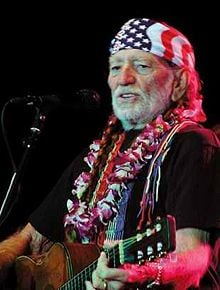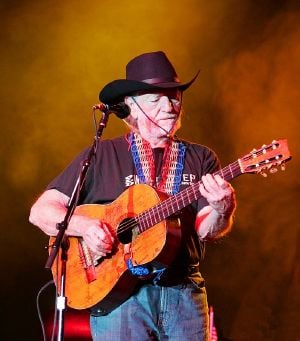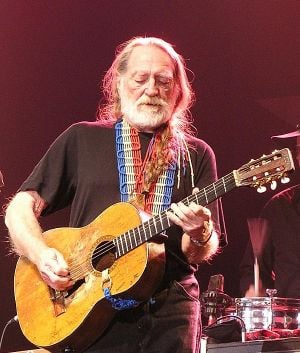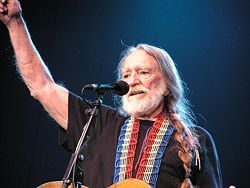Difference between revisions of "Willie Nelson" - New World Encyclopedia
(→Legacy) |
(→Legacy) |
||
| Line 90: | Line 90: | ||
Willie Nelson is widely recognized as an [[United States|American]] [[icon]]. His distinctive music and other social and political activities sometimes take a backseat to his pop-culture public image, firmly grounded in the acknowledged reality of his life—that of an elderly, lifelong [[cannabis (drug)|marijuana]]-smoking, tax-evading, biodiesel-burning, old-school, [[cowboy]]-[[hippie]] [[troubadour]]. His image is marked by his red hair, often divided into two long [[braid]]s partially concealed under a bandana. He has been featured in recent advertisements for a variety of products and companies, including a 2002 spot directed by [[Peter Lindbergh]] for [[Gap (clothing)|Gap]] where he performs [[Hank Williams]]' "[[Move It On Over]]" alongside [[Ryan Adams]]. | Willie Nelson is widely recognized as an [[United States|American]] [[icon]]. His distinctive music and other social and political activities sometimes take a backseat to his pop-culture public image, firmly grounded in the acknowledged reality of his life—that of an elderly, lifelong [[cannabis (drug)|marijuana]]-smoking, tax-evading, biodiesel-burning, old-school, [[cowboy]]-[[hippie]] [[troubadour]]. His image is marked by his red hair, often divided into two long [[braid]]s partially concealed under a bandana. He has been featured in recent advertisements for a variety of products and companies, including a 2002 spot directed by [[Peter Lindbergh]] for [[Gap (clothing)|Gap]] where he performs [[Hank Williams]]' "[[Move It On Over]]" alongside [[Ryan Adams]]. | ||
During [[Image:Willie UK2K7 1.JPG|thumb|right|250px|Willie Nelson during a show in Cardiff, January 2007]] | During [[Image:Willie UK2K7 1.JPG|thumb|right|250px|Willie Nelson during a show in Cardiff, January 2007]] | ||
| + | |||
| + | A prolific songwriter, Nelson has penned a number of hits, including: "And So Will You, My Love," "Crazy," "Blood Mary Morning," "Funny How Time Slips Away," "Hello Walls," "I'm Still Not Over You," "Island in the Sun," "Night Life," "On the Road Again," and "Remember the Good Times." | ||
| + | |||
| + | Nelson has won 10 Grammies, including, most recently, Best Country Collaboration With Vocals in 2008, and a Lifetime Achievement Award in 1999. Other recognition, includes: TNN/Music City News: Living Legend and TNN/Music City News: Minnie Pearl Award (both in 1995), five Academy of Country Music Awards, nine Country Music Association Awards, and seven American Music Awards. | ||
| + | In 1993, he was inducted into the Country Music Hall of Fame. | ||
==Discography== | ==Discography== | ||
Revision as of 21:15, 17 November 2008
| Willie Nelson | |
|---|---|
 | |
| Background information | |
| Birth name | Willie Hugh Nelson |
| Born | April 30 1933 (age 91) |
| Origin | Abbott, Texas, U.S. |
| Genre(s) | Outlaw country, alternative country |
| Occupation(s) | Singer, Songwriter, Guitarist, Producer, Session Musician, Actor, Activist |
| Instrument(s) | Acoustic Guitar |
| Years active | 1956 – Present |
| Label(s) | Liberty, RCA, Atlantic, Columbia, Island, Justice Records, Lost Highway |
| Associated acts | Waylon Jennings, The Highwaymen, Johnny Cash, Kris Kristofferson, Ray Price, Merle Haggard, Kurt Nilsen, Faron Young |
Willie Nelson (born April 30, 1933) is an American country singer-songwriter, author, poet, and actor. He reached his greatest fame during the outlaw country movement of the 1970s, but remains iconic, especially in American popular culture. In recent years he has continued to tour, record, and perform, and this, combined with activities in advocacy of marijuana, as well as a well-publicized 2006 arrest for marijuana possession, have made him the subject of renewed media attention.
Biography
Early life and career
Nelson was born and raised in Abbott, Texas, the son of Myrle and Ira D. Nelson, who was a mechanic and pool-hall owner. His grandparents William Alfred Nelson and Nancy Elizabeth Smothers gave him mail-order music lessons starting at age six. He wrote his first song when he was seven and was playing in a local band at age nine. Nelson played the guitar, while his sister Bobbie played the piano. He met Bud Fletcher, a fiddler, and two siblings joined his band, Bohemian Fiddlers, while Nelson was in high school. While he was in high school, he took part in the National FFA Organization (formerly known as the Future Farmers of America).
Beginning in high school, Nelson worked as a disc jockey for local radio stations. Nelson had short DJ stints with KHBR in Hillsboro, Texas, and later with KBOP in Pleasanton, Texas, while singing locally in honky tonk bars.
Nelson graduated from Abbott High School in 1951, joining the Air Force the same year, but was discharged after nine months due to back problems. He then studied agriculture at Baylor University for one year in 1954.
In 1956, Nelson moved to Vancouver, Washington, to begin a musical career, recording "Lumberjack," which was written by Leon Payne. The single sold fairly well, but did not establish a career. Nelson continued to work as a radio announcer in Vancouver and sing in clubs. He sold a song called "Family Bible" for $50.00; the song was a hit for Claude Gray in 1960, has been covered widely and is often considered a gospel music classic.
Popular songwriter
Nelson moved to Nashville in 1960, but was unable to land a record label contract. He did, however, receive a publishing contract at Pamper Music. After Ray Price recorded Nelson's "Night Life" (reputedly the most covered country song of all time; a version of "Night Life" was even recorded by convicted killer and former cult leader Charles Manson, Nelson joined Price's touring band as a bass player. While playing with Ray Price and the Cherokee Cowboys, many of Nelson's songs became hits for some of country and pop music's biggest stars of the time. These songs include "Funny How Time Slips Away" (Billy Walker), "Hello Walls" (Faron Young), "Pretty Paper" (Roy Orbison), and most famously, "Crazy" (Patsy Cline). Nelson signed with Liberty Records in 1961 and released several singles, including "Willingly" (sung with his wife, Shirley Collie) and "Touch Me."
He was unable to keep his momentum going, however, and Nelson's career ground to a halt. Demo recordings from his years as a songwriter for Pamper Music were later discovered and released as Crazy: The Demo Sessions (2003).
Austin
In 1965, Nelson moved to RCA Victor Records and joined the Grand Ole Opry. He followed this with a series of minor hits and then retired and moved to Austin, Texas. While in Austin, with its burgeoning "hippie" music scene (see Armadillo World Headquarters), Nelson decided to return to music. His popularity in Austin soared, as he played his own brand of country music marked by rock and roll, jazz, western swing, and folk influences. A lifelong passion for running and a new commitment to his own health also began during this period.
In the mid 1970's, Nelson purchased property near Lake Travis in Austin and built Pedernales Studio. The studio underwent state-of-the-art renovations in the mid 1990s, and many top recording artists adorn its client list. Its amenities include a nine-hole golf course, tennis courts, and an Olympic-size swimming pool.
Outlaw country
Nelson signed with Atlantic Records and released Shotgun Willie (1973), which won excellent reviews but did not sell well. Phases and Stages (1974), a concept album inspired by his divorce, included the hit single "Bloody Mary Morning." Nelson then moved to Columbia Records, where he was given complete creative control over his work. The result was the critically acclaimed, massively popular concept album, Red Headed Stranger (1975). Although Columbia was reluctant to release an album with primarily a guitar and piano for accompaniment, Nelson insisted (with the assistance of Waylon Jennings) and the album was a huge hit, partially because it included a popular cover of "Blue Eyes Crying in the Rain" (written by Fred Rose in 1945). "Blue Eyes Crying in the Rain" became Nelson's first number-one hit as a singer.
Along with Nelson, Waylon Jennings was also achieving success in country music in the early 1970s, and the pair were soon combined into a genre called outlaw country ("outlaw" because it did not conform to Nashville standards). The term "outlaw country" is derived from the song "Ladies Love Outlaws" written by Lee Clayton and sung by Waylon Jennings on the 1972 album of the same name. It became associated with singers who grew their hair long, wore denim and leather and looked like hippies in contrast to the clean cut country singers in Nudie suits that were pushing the Nashville sound. The success of these singers did much to restore the rawness and life force to country music. The songs were about drinking, drugs, hard working men and honky tonk heroes. The music was more like rock and roll and there were no strings in the background.
Nelson's outlaw image was cemented with the release of the album Wanted! The Outlaws (1976, with Waylon Jennings, Jessi Colter, and Tompall Glaser), country music's first platinum album. Nelson continued to top the charts with hit songs during the late 1970s, including "Good Hearted Woman" (a duet with Jennings), "Remember Me," "If You've Got the Money I've Got the Time," "Uncloudy Day," "I Love You a Thousand Ways," and "Something to Brag About" (a duet with Mary Kay Place).
In 1978, Nelson released two more platinum albums, Waylon and Willie (a collaboration with Jennings that included "Mammas Don't Let Your Babies Grow Up to Be Cowboys," which was written and originally recorded as a hit single by Ed Bruce a couple of years earlier), and Stardust, an unusual album of popular standards. It was produced by Booker T. Jones. Though most observers predicted that Stardust would ruin his career, it ended up being one of his most successful recordings.
Hits, excesses, and Farm Aid
The 1980s saw a series of hit singles: "On the Road Again" from the movie Honeysuckle Rose and "To All the Girls I've Loved Before" (a rather incongruous duet with Julio Iglesias). There were also more popular albums, including Pancho & Lefty (1982, with Merle Haggard), WWII (1982, with Waylon Jennings), and Take it to the Limit (1983, with Waylon Jennings).
In the mid-1980s, Nelson, Waylon Jennings, Kris Kristofferson, and Johnny Cash formed a group called The Highwaymen. They achieved unexpectedly massive success, including platinum-record sales and worldwide touring. Meanwhile, he became more and more involved in charity work, such as establishing the Farm Aid concerts in 1985.
In 1990, the Internal Revenue Service (IRS) handed Nelson a bill for $16.7 million in back taxes and seized most of his assets to help pay the charges. He released The IRS Tapes: Who'll Buy My Memories? as a double album, with all profits going straight to the IRS. Many of his assets were auctioned and purchased by friends, who gave his possessions back to him or rented them at a nominal fee. He sued accounting firm Price Waterhouse, contending that they put him into tax shelters that were later disallowed. The lawsuit was settled for an undisclosed amount. His debts were paid by 1993.
In 1996, Willie Nelson was featured on the Beach Boys' now out-of-print album Stars and Stripes Vol. 1 singing a cover of their 1964 song "The Warmth of the Sun" with the Beach Boys themselves providing the harmonies and backing vocals.
Hard-Drivin' American troubadour
He released Across the Borderline in 1993, with guests Bob Dylan, Sinéad O'Connor, David Crosby, Bonnie Raitt, Kris Kristofferson, and Paul Simon.
During the 1990s and 2000s, Nelson has toured continuously and released albums that generally received mixed reviews, with the exception of 1998's critically acclaimed Teatro, and featured supporting vocals by Emmylou Harris). Later that year, he joined rock band Phish onstage for several songs as part of the annual Farm Aid festival. He also performed a duet concert with fellow Highwayman Johnny Cash, recorded for the VH1 Storytellers series.
In 2002 Willie released the album, The Great Divide. A few songs on the album were written by Rob Thomas of Matchbox 20 and Bernie Taupin. Willie Nelson performed a duet on "Beer for my Horses" with Toby Keith on Keith's Unleashed album released in 2002. The single topped the Billboard Hot Country Songs charts for six consecutive weeks and the video won an award for "Best Video" at the Academy of Country Music Awards held on May 26, 2004.
Nelson received Kennedy Center Honors in 1998. A star-studded television special celebrating his seventieth birthday aired in 2003. In 2004, he released Outlaws & Angels, featuring guests Toby Keith, Joe Walsh, Merle Haggard, Kid Rock, Al Green, Shelby Lynne, Carole King, Toots Hibbert, Ben Harper, Lee Ann Womack, The Holmes Brothers, Los Lonely Boys, Lucinda Williams, Keith Richards, Jerry Lee Lewis, and Rickie Lee Jones.
Willie Nelson: An Epic Life by Joe Nick Patoski was released in April 2008, and contains over 100 interviews with Nelson, his family, his band, the people he grew up with in Abbott, and many others. This is part biography, part memoir, part history, from the Depression to Nelson as he celebrates his seventy-fifth birthday.
On January 29, 2008 Nelson released his latest album entitled Moment of Forever. The January 2008 issue of High Times magazine has Willie Nelson on the cover with an interview. In May 2008, Nelson appeared on a duet with Norwegian pop star and former World Idol winner Kurt Nilsen on the country classic "Lost Highway." The single topped the Norwegian charts and was released on Nilsen's album Rise To The Occasion. In May 2008, Willie Nelson appeared in Amsterdam with rap icon Snoop Dogg (the rap "weed smoker") where they did a live version of "SuperMan." Subsequently the two have become friends and recently released a video "My Medicine," which has received much play on YouTube.
Acting career
Nelson began acting, appearing in The Electric Horseman (1979), Honeysuckle Rose (1980), Thief (1981), and Barbarosa (1982). Also in 1982, he played "Red Loon," in Coming Out of the Ice with John Savage. In 1984, he starred in the movie Songwriter, with Kris Kristoferson guest starring. He then had the lead role in Red Headed Stranger (1986, with Morgan Fairchild), as country singer-songwriter Johnny Dean in Wag the Dog (1997), Gone Fishin (1997) as Billy 'Catch' Pooler, the 1986 TV movie Stagecoach (with Johnny Cash), and Dukes of Hazzard (2006).
He has continued acting since his early successes, but usually in smaller roles and cameos, some of which involve his status as a cannabis activist and icon. One of his more popular recent cameos was a performance in Half Baked as an elderly "Historian Smoker" who, while smoking marijuana would reminisce about how things used to be in his younger years. Nelson also appeared as himself in the 2006 movie Beerfest, looking for teammates to join him in a mythical world-championship cannabis-smoking contest held in Amsterdam. That same week Willie Nelson recorded, "I'll Never Smoke Weed with Willie Again" with Toby Keith.
Activism
In 2004, Nelson and his wife Annie became partners with Bob and Kelly King in the building of two Pacific Bio-diesel plants, one in Salem, Oregon, and the other at Carl's Corner, Texas, (the Texas plant was founded by Carl Cornelius, a longtime Nelson friend). In 2005, Nelson and several other business partners formed Willie Nelson Bio-diesel("Bio-Willie"), a company that is marketing bio-diesel bio-fuel to truck stops. The fuel is made from vegetable oil (mainly soybean oil), and can be burned without modification in diesel engines.
Nelson is a co-chair of the National Organization for the Reform of Marijuana Laws (NORML) advisory board. He has worked with NORML for years for marijuana legalization and has produced commercials for NORML that have appeared on Pot TV programs. He has also recorded a number of radio commercials for the organization. In 2005, Nelson and his family hosted the first annual "Willie Nelson & NORML Benefit Golf Tournament," which appeared on the cover of High Times magazine.
On January 9, 2005, Nelson headlined an all-star concert at Austin Music Hall to benefit the victims of the 2004 Indian Ocean earthquake. Tsunami Relief Austin to Asia raised an estimated $120,000 for UNICEF and two other organizations.
Nelson is an advocate for horses and their treatment. He has been campaigning for passage of the American Horse Slaughter Prevention Act (H.R. 503/S. 311) with the Animal Welfare Institute. He is on the Board of Directors and has adopted a number of horses from Habitat for Horses.
He founded the Willie Nelson Peace Research Institute in April 2007. Nelson and his daughter Amy Nelson wrote a song called "A Peaceful Solution," which they released into the public domain, and encouraged artists to render their own version of the song, which he would feature on the Institute's web site. Nelson also is an honorary trustee of the Dayton International Peace Museum.
Legacy
Willie Nelson is widely recognized as an American icon. His distinctive music and other social and political activities sometimes take a backseat to his pop-culture public image, firmly grounded in the acknowledged reality of his life—that of an elderly, lifelong marijuana-smoking, tax-evading, biodiesel-burning, old-school, cowboy-hippie troubadour. His image is marked by his red hair, often divided into two long braids partially concealed under a bandana. He has been featured in recent advertisements for a variety of products and companies, including a 2002 spot directed by Peter Lindbergh for Gap where he performs Hank Williams' "Move It On Over" alongside Ryan Adams.
During
A prolific songwriter, Nelson has penned a number of hits, including: "And So Will You, My Love," "Crazy," "Blood Mary Morning," "Funny How Time Slips Away," "Hello Walls," "I'm Still Not Over You," "Island in the Sun," "Night Life," "On the Road Again," and "Remember the Good Times."
Nelson has won 10 Grammies, including, most recently, Best Country Collaboration With Vocals in 2008, and a Lifetime Achievement Award in 1999. Other recognition, includes: TNN/Music City News: Living Legend and TNN/Music City News: Minnie Pearl Award (both in 1995), five Academy of Country Music Awards, nine Country Music Association Awards, and seven American Music Awards. In 1993, he was inducted into the Country Music Hall of Fame.
Discography
ReferencesISBN links support NWE through referral fees
- Allen, Bob. "Willie Nelson." In The Encyclopedia of Country Music. Paul Kingsbury, Editor. New York: Oxford University Press, 1998. ISBN 978-0195116717
- Patoski, Joe Nick. Willie Nelson: An Epic Life. Little, Brown and Company, 2008. ISBN 0316017787
- Pipkin, Turk. The Tao of Willie: A Guide to the Happiness in Your Heart. New York: Gotham, 2006. ISBN 1-59240-197-X
- Shrake, Bud. Willie: Autobiography. New York: Random House, 1988. ISBN 0-8154-1080-8
External links
| Persondata | |
|---|---|
| NAME | Nelson, Willie Hugh |
| ALTERNATIVE NAMES | |
| SHORT DESCRIPTION | American entertainer and songwriter |
| DATE OF BIRTH | April 30, 1933 |
| PLACE OF BIRTH | Abbott, Texas, United States of America |
| DATE OF DEATH | |
| PLACE OF DEATH | |
Credits
New World Encyclopedia writers and editors rewrote and completed the Wikipedia article in accordance with New World Encyclopedia standards. This article abides by terms of the Creative Commons CC-by-sa 3.0 License (CC-by-sa), which may be used and disseminated with proper attribution. Credit is due under the terms of this license that can reference both the New World Encyclopedia contributors and the selfless volunteer contributors of the Wikimedia Foundation. To cite this article click here for a list of acceptable citing formats.The history of earlier contributions by wikipedians is accessible to researchers here:
The history of this article since it was imported to New World Encyclopedia:
Note: Some restrictions may apply to use of individual images which are separately licensed.



